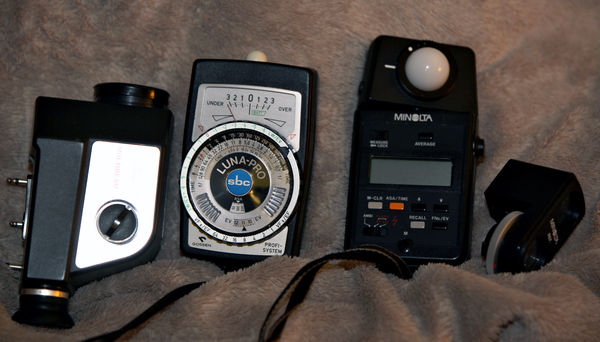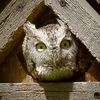Light meters question?
Jan 14, 2013 07:42:17 #
donrent wrote:
========================================
What I meant by the above Q was how do you set for the "film" speed when using a digital cam ?
Do you use the ISO setting in place of the "film" speed setting ???
donrent wrote:
How did you set the "old" film meter to compensate for "digital" ?
========================================
What I meant by the above Q was how do you set for the "film" speed when using a digital cam ?
Do you use the ISO setting in place of the "film" speed setting ???
No conversion needed. They are the same numbers with a different name.
Jan 14, 2013 08:50:35 #
Simple answer is yes,
sometimes the old meters are marked ASA which is the same as ISO, some may also be marked with DIN which i believe was a European System 24DIN = 200ASA = 200ISO
Graham
sometimes the old meters are marked ASA which is the same as ISO, some may also be marked with DIN which i believe was a European System 24DIN = 200ASA = 200ISO
Graham
Jan 14, 2013 09:00:03 #
The problem with needle based meters is that they must be calibrated. Only certain needle based meters have service centers which perform calibrations. This is not to say they HAVE to have a calibration, but when the shooting day costs more than your house (in the movies) the meter MUST be calibrated. Spectra meters were a long time favorite in Hollywood for this reason. I had mine calibrated, of course, before going digital.
Digital, like the Minolta meters, are uncanny in consistency and capability. I find a flash reading color meter and flashmeter for exposure are indispensable tools, which are great for DSLRs which allow manual Kelvin adjustment.
Digital, like the Minolta meters, are uncanny in consistency and capability. I find a flash reading color meter and flashmeter for exposure are indispensable tools, which are great for DSLRs which allow manual Kelvin adjustment.
Jan 14, 2013 09:27:38 #
Danilo wrote:
Good question, Tim! br I used the Gossen Luna Pro ... (show quote)
I would agree with Danilo, Tim. I use a Gossen Luna Pro F, which uses a "zeroing" system. It's fast, accurate and, best of all and why I like it better than the digital version, easy to read. You can also get a cheap vari-angle attachment for the Luna Pro which restricts its angle of view either to 15 or 7.5 degrees, allowing it to make more precise readings. However, the single most important factor, in my view at least, is that you can take in all the pertinent information at a glance.
Jan 14, 2013 10:02:59 #
donrent wrote:
========================================
What I meant by the above Q was how do you set for the "film" speed when using a digital cam ?
Do you use the ISO setting in place of the "film" speed setting ???
donrent wrote:
How did you set the "old" film meter to compensate for "digital" ?
========================================
What I meant by the above Q was how do you set for the "film" speed when using a digital cam ?
Do you use the ISO setting in place of the "film" speed setting ???
I guess, it will be my first light meter and will figure that out when I get them. I now know these can be used. Thanks Donrent
Jan 14, 2013 12:12:01 #
tim57064 wrote:
I have made a few purchases of light meters and wa... (show quote)
For what it's worth, I use a Gossen Luna Pro SBC analog and a Minolta IIIF digital, have for many years, and occasionally check one against the other as well as my in-camera meter. I also find that many times my in-camera meter works pretty well in most situations when compared with these two meters, in situations where I don't let it be fooled by the scene - not better, but well - enough so that I am confident I can rely on it except in the most critical situations where the light is really funky. I also have the spot attachment for both which adds flexibility - comes in real handy.


Jan 14, 2013 12:53:43 #
I've used many different light meters over the years. My issue now is readability of the settings indicated.
I got rid of my old light meters about a month ago and consider myself lucky to the $25 for a lot of 7 assorted Selenium and battery powered meters.
My favorite analog meter was a Gossen Luna Pro SBC. The SBC stands for Silicon Blue Cell, a faster diode that could read a wider range of light values. Bulky, and as I recall used a currently available 9 volt battery.
However, in the digital meter area, there is a lot of choice available. I only had one, a Gossen Luna Pro F... very light, fit in your palm or shirt pocket. LARGE digital readout characters, and used a single AA battery which seemed to last a very long time.
I think now if I were looking for one, I would try the little Gossen Digisix.
However, if I were doing studio, portrait and other wide ranges of work with varied lighting, I would step up to a Sekonic, on the high end. They have had some great video presentations on the internet lately... Webinar presentations. Looks as if one of the higher end Sekonics would be the ticket.
However, for fairly routine metering, that Gossen Digital Luna Pro F was my best light meter experience so far. I found it on Craigslist in Portland Oregon for $80 (very good price like new) I used it with a large Medium Format camera that had no meter. Great combination.
I got rid of my old light meters about a month ago and consider myself lucky to the $25 for a lot of 7 assorted Selenium and battery powered meters.
My favorite analog meter was a Gossen Luna Pro SBC. The SBC stands for Silicon Blue Cell, a faster diode that could read a wider range of light values. Bulky, and as I recall used a currently available 9 volt battery.
However, in the digital meter area, there is a lot of choice available. I only had one, a Gossen Luna Pro F... very light, fit in your palm or shirt pocket. LARGE digital readout characters, and used a single AA battery which seemed to last a very long time.
I think now if I were looking for one, I would try the little Gossen Digisix.
However, if I were doing studio, portrait and other wide ranges of work with varied lighting, I would step up to a Sekonic, on the high end. They have had some great video presentations on the internet lately... Webinar presentations. Looks as if one of the higher end Sekonics would be the ticket.
However, for fairly routine metering, that Gossen Digital Luna Pro F was my best light meter experience so far. I found it on Craigslist in Portland Oregon for $80 (very good price like new) I used it with a large Medium Format camera that had no meter. Great combination.
Jan 14, 2013 14:22:50 #
donrent wrote:
========================================
What I meant by the above Q was how do you set for the "film" speed when using a digital cam ?
Do you use the ISO setting in place of the "film" speed setting ???
donrent wrote:
How did you set the "old" film meter to compensate for "digital" ?
========================================
What I meant by the above Q was how do you set for the "film" speed when using a digital cam ?
Do you use the ISO setting in place of the "film" speed setting ???
Yes
Jan 14, 2013 16:06:46 #
jdventer wrote:
Yes
donrent wrote:
========================================
What I meant by the above Q was how do you set for the "film" speed when using a digital cam ?
Do you use the ISO setting in place of the "film" speed setting ???
donrent wrote:
How did you set the "old" film meter to compensate for "digital" ?
========================================
What I meant by the above Q was how do you set for the "film" speed when using a digital cam ?
Do you use the ISO setting in place of the "film" speed setting ???
Yes
This may have been spoken to, and it may seem obvious, but that would mean setting a specific ISO/ASA on the camera, rather than using auto ISO, and then using the manual controls for both aperture and shutter, if you want to override the camera from metering the shot.
Jan 14, 2013 19:26:24 #
Kuzano wrote:
quote=jdventer quote=donrent quote=donrent How ... (show quote)
I think you have the general idea. When a camera is set to Auto ISO the camera picks an ISO value when a photo is taken. To use an external light meter to determine the f-stop and shutter speed to use you will need to choose a single fixed ISO value (200 should work) and set the ISO on your camera to that ISO value.
Jan 14, 2013 19:31:51 #
donrent wrote:
========================================
What I meant by the above Q was how do you set for the "film" speed when using a digital cam ?
Do you use the ISO setting in place of the "film" speed setting ???
donrent wrote:
How did you set the "old" film meter to compensate for "digital" ?
========================================
What I meant by the above Q was how do you set for the "film" speed when using a digital cam ?
Do you use the ISO setting in place of the "film" speed setting ???
ISO and Film Speed should be interchange able, but I would expect some trial and error to be needed to get the desired exposure from a specific camera and a specific Meter.
Jan 14, 2013 19:37:14 #
It should be a good learning experience but, I would not expect there to be any other benefit from using them.
tim57064 wrote:
I have made a few purchases of light meters and wa... (show quote)
Jan 14, 2013 19:39:29 #
jdventer wrote:
It should be a good learning experience but, I wou... (show quote)
Thanks for all your advice. Tim
Jan 14, 2013 19:40:59 #
I forgot to mention that it should be fun to play with them.
tim57064 wrote:
quote=jdventer It should be a good learning exper... (show quote)
Jan 14, 2013 19:46:53 #
flashgordonbrown
Loc: Silverdale, WA
donrent wrote:
========================================
What I meant by the above Q was how do you set for the "film" speed when using a digital cam ?
Do you use the ISO setting in place of the "film" speed setting ???
donrent wrote:
How did you set the "old" film meter to compensate for "digital" ?
========================================
What I meant by the above Q was how do you set for the "film" speed when using a digital cam ?
Do you use the ISO setting in place of the "film" speed setting ???
ISO and 'film speed' are the same thing. ISO was used for film sensitivity before there were any digital imaging devices.
If you want to reply, then register here. Registration is free and your account is created instantly, so you can post right away.



